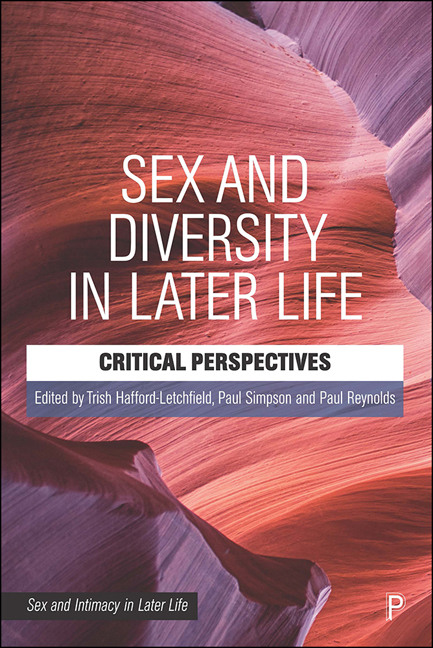Book contents
- Frontmatter
- Dedication
- Contents
- List of figures and tables
- Notes on editors and contributors
- Series editors’ introduction
- Foreword
- 1 Sex and intimacy in later life: a survey of the terrain
- 2 Sexual expression and pleasure among black minority ethnic older women
- 3 Sexual desires and intimacy needs in older persons and towards the end of life
- 4 Heterosexual sex, love and intimacy in later life: what have older women got to say?
- 5 Sex and ageing in older heterosexual men
- 6 Sex and older gay men
- 7 Thinking the unthinkable: older lesbians, sex and violence
- 8 Splitting hairs: Michel Foucault’s ‘heterotopia’ and bisexuality in later life
- 9 The age of rediscovery: what is it like to gender transition when you are 50 plus?
- 10 Ageing asexually: exploring desexualisation and ageing intimacies
- 11 Older people, sex and social class: unusual bedfellows?
- 12 Final reflections: themes on sex and intimacy in later life
- Index
10 - Ageing asexually: exploring desexualisation and ageing intimacies
Published online by Cambridge University Press: 21 December 2021
- Frontmatter
- Dedication
- Contents
- List of figures and tables
- Notes on editors and contributors
- Series editors’ introduction
- Foreword
- 1 Sex and intimacy in later life: a survey of the terrain
- 2 Sexual expression and pleasure among black minority ethnic older women
- 3 Sexual desires and intimacy needs in older persons and towards the end of life
- 4 Heterosexual sex, love and intimacy in later life: what have older women got to say?
- 5 Sex and ageing in older heterosexual men
- 6 Sex and older gay men
- 7 Thinking the unthinkable: older lesbians, sex and violence
- 8 Splitting hairs: Michel Foucault’s ‘heterotopia’ and bisexuality in later life
- 9 The age of rediscovery: what is it like to gender transition when you are 50 plus?
- 10 Ageing asexually: exploring desexualisation and ageing intimacies
- 11 Older people, sex and social class: unusual bedfellows?
- 12 Final reflections: themes on sex and intimacy in later life
- Index
Summary
… now she becomes a different being, asexual but complete: an elderly woman.
(Simone de Beauvoir, 1949, p 626)what you got against old people talking about sex? You think we are not sexy anymore? You think I didn't have my share of husbands and lovers? You think sexy expires?
(Leanne Simpson, 2013, pp 106–7)Deep-seated ageist beliefs would have us take for granted that ‘sexy expires’, in the words of poet Leanne Simpson. According to this logic, as bodies age they become less attractive, less desirable, and less desiring of sex. This logic of ‘sexy expiring’ is deeply grounded in gendered and ageist colonial ideals of beauty and sexuality. The idea that with age ‘sexy expires’ is also, though less obviously, tied up in compulsory sexuality (Przybylo, 2011; Emens, 2014; Gupta, 2015) – or the idea that a person needs to be sexy and have sex in order to attain optimal health, vitality, and a ‘successful’ ageing process.
In this chapter, I unpack how compulsory sexuality operates alongside desexualisation for ageing adults in western countries at the end of the twentieth and beginning of the twenty-first centuries, where the pressure to have sex and remain vigorous into late life looms strong. Following asexuality studies and critical disability studies scholar Eunjung Kim (2010), I mark a difference between asexuality and desexualisation. Asexuality, or low-to-no sexual attraction to others, I take for granted as a real sexual identity and orientation that can exist at any age as well as emerging later in life (Przybylo, 2016). Further, I mark desexualisation as a harmful process of barring or preventing access to sex, sexual fulfilment, and sexual identity. Understood in this way, asexuality and desexualisation are not one and the same, since asexuality is affirmatively embraced as a component of identity, and desexualisation is a process by which equitable access to sex and sexual expression is prevented.
Desexualisation is at work in a complex way in contemporary western contexts in relation to older adults. On the one hand, through being encouraged not to have sex – through being desexualised – older adults are left out of the fold of full social and intimate participation. In this sense, the desexualisation of ageing adulthood is a form of harm.
- Type
- Chapter
- Information
- Sex and Diversity in Later LifeCritical Perspectives, pp. 181 - 198Publisher: Bristol University PressPrint publication year: 2021



